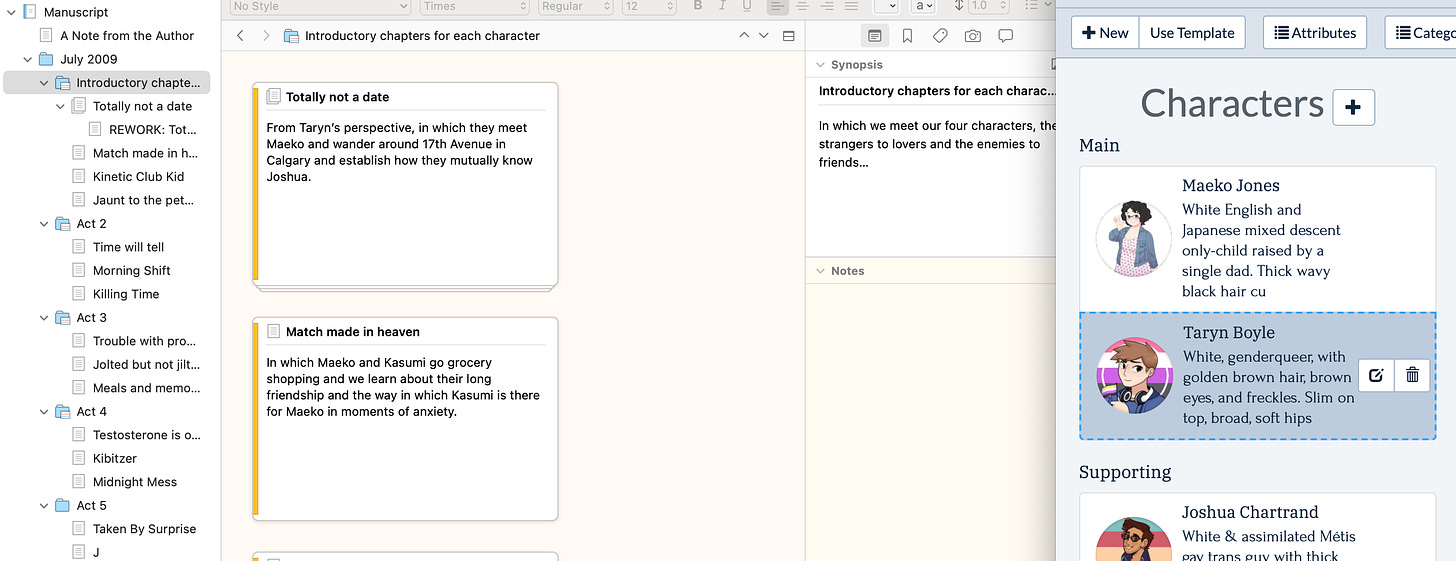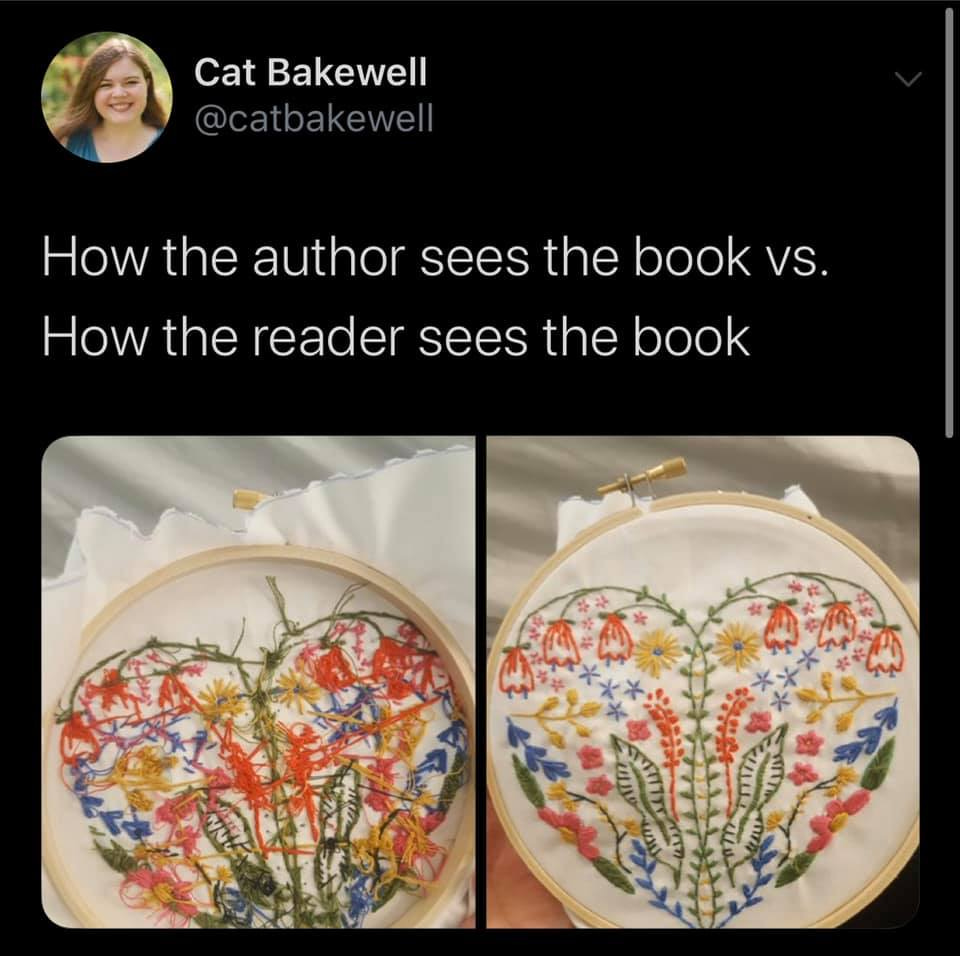Learning to Love Revision
A reflection on nearly one year of revising a single manuscript
In January 2021, I plotted out my many projects and made a schedule for the year. This included art pieces, a potential podcast, my over-all writing schedule, a few things that I have since dropped, and the revision of one manuscript from start to finish. The manuscript I chose has had many names over the years, but is currently titled Gendervexed.
I chose it for revision for several reasons:
1. Even though it had been years since I’d first drafted it, my love for the characters had not diminished. I wanted to get to know them again, and better.
2. After attending the Beyond Prescriptivism panel at the 2021 AWP conference, I was eager to jump in to telling the story I wanted to tell in the language only I could tell it in. Which ties in with…
3. …having read and absolutely adored Juliet Takes a Breathe1, I was giving myself permission to tell a story in the time and place in which I’d originally written it, instead of trying to constantly update my manuscripts to ever changing technology and slang. I wanted to embrace it as a period piece, if you will, capturing the unique and powerful experience of queer found family in the early oughts in Canadia.
Revision is a relatively new thing for me in that I only realised it is an essential part of the writing process about four years ago2. It took me a bit to get used to. At first I hated revising my work, if only because it was so embarrassing to see how truly terrible my writing was. I held a lot of perfectionist beliefs about inherent talent around my writing that I’ve never held in other areas. I never expected to be a good artist or graphic designer or podcaster right off the bat. I expected a learning curve, committed to it, and improved my skills over time.
Yet, because writing has been the one constant joy in my life, and because it’s been something I’ve been doing since my earliest memories, I held myself to some standard with it that I didn’t with any other skill I’ve cultivated. Getting over this is an ongoing process, but that began to change when I began to see how powerful it was that I could recognize how bad my old writing was. What better proof of improvement than being able to critique my own work?
This shift meant that revision stopped feeling terrible and began to be a pleasure. I was excited to fix mistakes, to improve dialogue, to flesh out characters and scenes and tighten the threads of the plot!
I dove into my revision of Gendervexed with great enthusiasm, using it as an opportunity to shift further some of my ideas about what it is to be a writer. This year has meant a lot of time reworking text, but it’s also meant writing out answers on character questionnaires, compiling playlists of different characters, and the rarely talked about but absolutely necessary writerly task of staring into the middle distance while playing out a scene or interaction or plot point in your head.
It has also meant finding readers.
About four chapters in, I started to feel the tangles of the tapestry I was weaving. It brought to mind a beautiful metaphor I encountered in a Tumblr post some time ago. The specifics are lost to me now, but the OP wrote that the reason writing gets harder as you go along is a lot like why churning butter gets harder with time. When you start out, you might have a good base, but it’s all thin—plot, characters, world building. The more you write, the more you churn, the thicker it becomes. It gets harder because it’s also getting better. There is fat to it, depth, a solidity that will make it a good story.
Every passing month this year has been strengthening my writing muscles. But I don’t have to carry it alone. Yes, the majority of the work is up to me. Only I can bring this to fruition, but having fellow writers and prolific readers looking at what I’m weaving together as I’m in the process helps immensely.
So much of this process involves going back and forth. I add something in the fifth chapter and it gives me an idea of something that can go into the second chapter. I get to the seventh chapter and my readers consistently tell me that the first chapter needs work to be as fleshed out and fabulous. I rewrite the first chapter and it gives me an opportunity to build tension in the eighth chapter. And so on and so on and so on.
Learning this back and forth pattern to revision has been challenging, but also fun. With each tweak or major rewrite, I give myself further permission to not get things right. While revision is happening, it’s all in process. There are no final drafts yet, and that’s a blessing!
Truly, the gift I’ve given myself by commiting to this one project for the year (and going hard at it for the month of November) is one of love. I love writing like I haven’t since I first finished this manuscript back in 2008. I am writing because I can, because it’s fun, because I have a community around it who supports me. And these days, having something that generates such joy is worth celebrating.
~~
PAID SUBSCRIBERS! I shall publish some of these work-in-progress chapters soon! For your pleasure, and, if you fancy, for your feedback too. Hearing what is working, what people love, which characters you want to learn more about, it all helps.
If you’re not a paid subscriber, you can totally become one and get access to Never Before Shared writing content.
And as ever, engagement with my content is super appreciated.
You should buy this book. Or get it out of the library. Roxane Gay says it’s ‘F**king Outstanding’ and she is not wrong. This is the queer coming of age story we deserve.
Despite my best efforts, I remain slightly bitter that through every job fair and job prep meeting and post-secondary plan conversation with teachers, school councilors, and career coaches, not one person ever mentioned that I could actually study for writing. All the stories I had of writers were about them writing on the side, in the evenings and on weekends, until some point when they had a finished manuscript, found a publisher and voila! They could quit whatever their job had been and finally do the thing they loved! It wouldn’t occur to me until much later, as I realised that maybe the fact that I couldn’t possibly afford a house at 21 like my parents had, or that a lot of those stories were about white men with good connections through their post-secondary experience, that maybe there were systemic things at play and also, times had changed.




